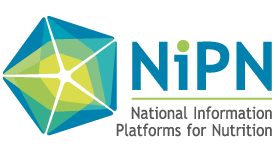Activity A: Setting the agenda of the workshop (2/7)
3. Which questions and data analyses lend themselves best to the NIPN approach?
Because one of the key principles of NIPN is to use and analyse existing data, certain type of questions, and thus analyses, add a lot of value to the policy dialogue in country and are therefore highly recommended.
In a context of increased accountability for the Multisectoral Nutrition Plans of Actions to achieve national and global targets, analyses of existing data will help to better understand "implementation progress” towards these targets. Progress can be measured at different levels of the impact pathway, which ranges from inputs (financial and human resources, activities (interventions), outputs (coverage) and outcomes (determinants) to nutrition impact (see page 7). Examples of appropriate questions are listed in the table below.
Existing data, however, are often less useful to answer questions related to measuring causality, impact and cost-efficiency. To answers such type of questions, data need to be collected for that very purpose, using a specific research set-up and data collection methods, to ensure robust and appropriate data analysis and correct interpretation. Use of existing data for modelling or other complex analyses will lead to results that cannot be easily translated into actionable recommendations for policy decision makers, and therefore do not add much value to the policy dialogue. Though questions regarding causality, impact and cost-efficiency are very legitimate and of high importance to decision makers, they are not recommended for analysis by NIPN.
The choice for data analysis methods is based on data availability , data quality and capacity of the team. The details of this information are explained in the guidance note on data analysis (section 3.4), as well as in the Technical Note on Data Analysis.



